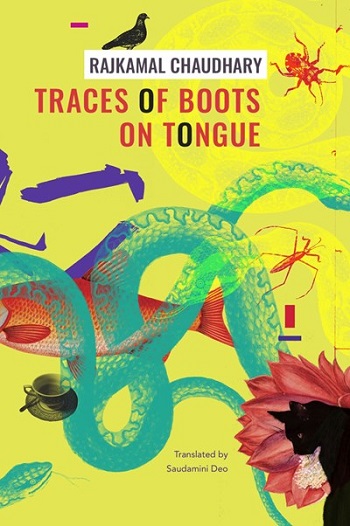[ad_1]
When an occupation has ended, what do we have left? Traces of Boots on Tongue: And Other Stories addresses the question in micro and macro forms, within the narratives of the story, and in a broader sense of time and place. Set in the early years of independent India, this short story collection delves into the daily lives and yearnings of working-class Indians. The impact of their colonization is understood but not seen, a distant taste. The wealth of generations slowly dwindling, mounting desperation, and characters yearning to make their voices heard beneath familial and societal oppression. While the stories can read obscure and details are often lost to the unaccustomed reader, the suspension of narrative tension that Rajkamal Chaudhary creates keeps us invested from the jump.
Chaudhary varies his point of view and character types with nearly every story. From the raucous voice of a disrespectful family man in “Pyramid” to the detached drunken observer in “A Man in Anger” to a somewhat omniscient but indignant presence in “A Champa Bud: A Venomous Snake” to a grieving, manic mother in “Veni Sanhar,” we drift in and out of closeness to these various characters. Minute events are magnified to the point of claustrophobia, making simple domestic scenes into stage plays where every movement matters. When Champa “silently walked out of the room giving mother a sharp look of disregard,” we breathe out a little for her safety. When the newly married Sarla ignores her former lover to speak to another man, our heart quickens from the tension effortlessly built over the past several pages. Even when we delve into folklore in “Veni Sanhar,” Sita’s confinement in new motherhood and her own mental state is very much real.
In subtleties, credit needs to be given to the translator, Saudamini Deo, for capturing the look and feel of Indian English from the original Hindi. The use of little phrases such as “3-4 days” mirror the sound of spoken speech and the work feels instantly familiar to those of us who know characters like this. Hindi is not my family’s mother tongue, I hardly recognize individual words in movies, but the direct translations of Indian language to an English distinct from American or that of other countries is immediately recognizable. However, by contrast, the uses of dialect among characters of lesser means feels somewhat alien and does not come across as familiar when rendered into English.
Additionally, more literary tales such as “Snakes of Silent Valleys” are difficult to follow, as titles and names take different forms in different characters’ mouths and we are unsure at times who our narrator is, the significance of their monologue, or the stakes of the actions at play. The prose is lofty and atmospheric but shrouds the story itself. By contrast, the most literal tales like “A Champa Bud” and “A Man in Anger” remain clear despite their fluctuating points of view and lapses in and out of past and present. Overall the collection is uneven, but the melancholy and confusion of the characters keep the book cohesive from beginning to end. One does not need to be Bengali, or even Indian, to appreciate what Chaudhary has created on the page, but there may be lapses in understanding that we must acknowledge, appreciate, and move on from.

FICTION
Traces of Boots on Tongue: And Other Stories
by Rajkamal Chaudhary, Translated by Saudamini Deo
Seagull Books
Published on November 05, 2022

[ad_2]
Source link

